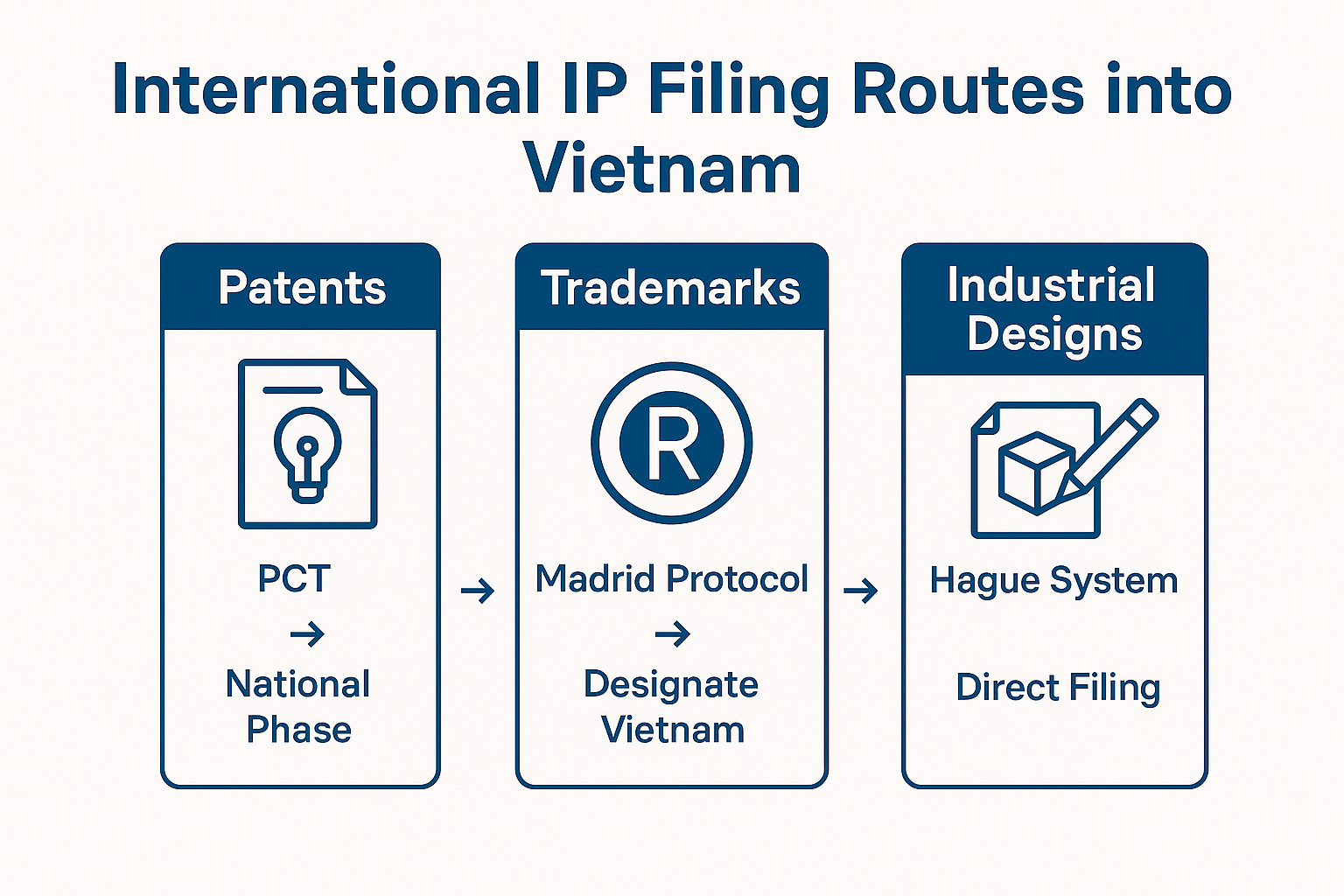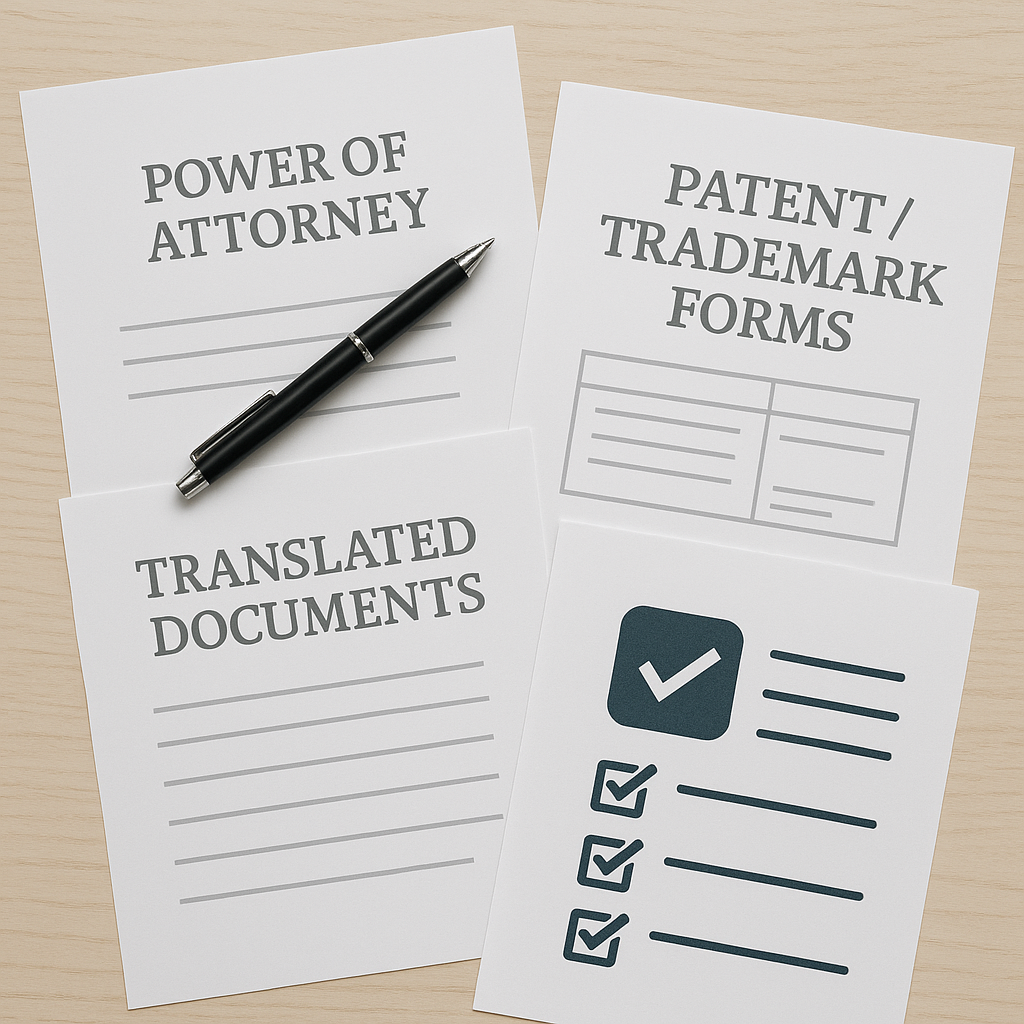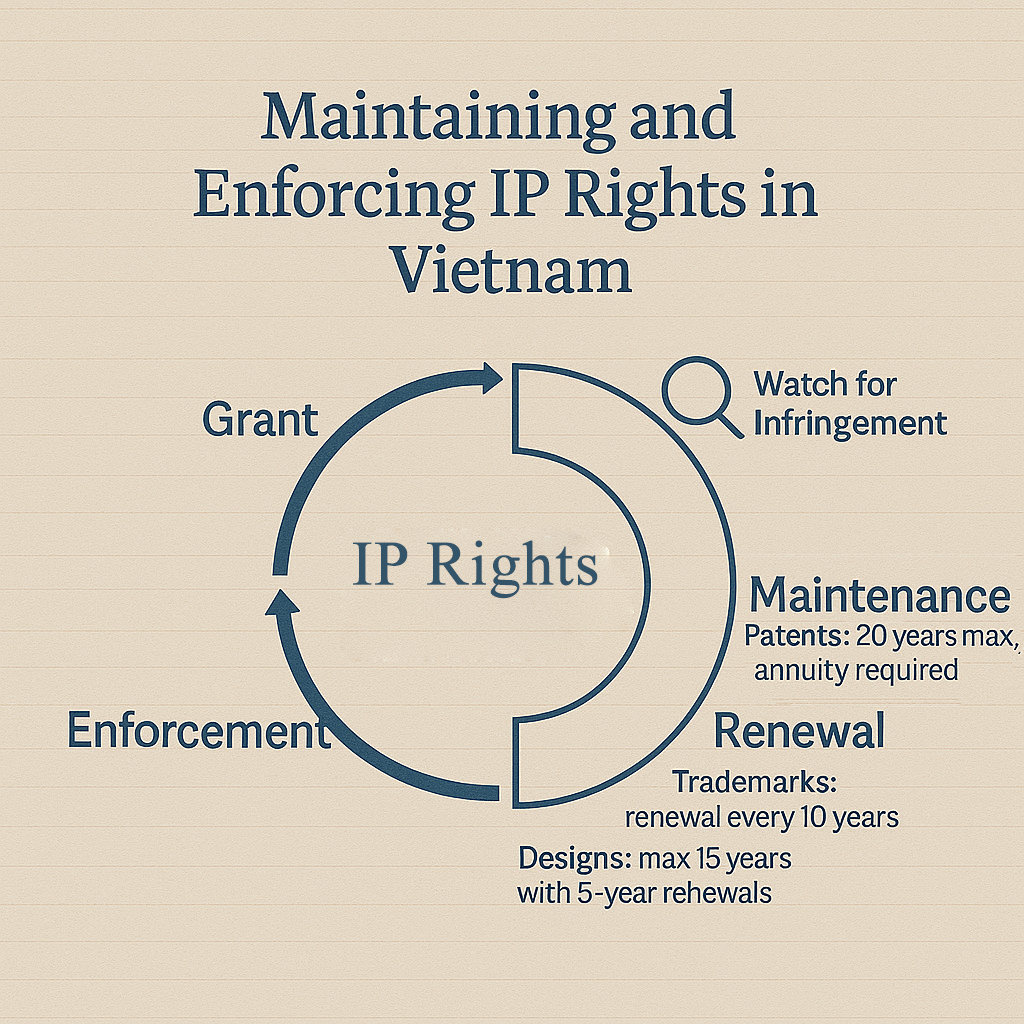For international entities seeking to safeguard their intellectual property (IP) within Vietnam, adherence to specific legal frameworks and procedures mandated by Vietnamese law is paramount. Whether your objective involves securing a patent through the Patent Cooperation Treaty (PCT), registering a trademark under the Madrid Protocol, or protecting an industrial design via the Hague System or a direct national filing, Vietnam has established clear pathways for international applicants transitioning into its national phase. This comprehensive guide elucidates the necessary steps for foreign applicants to successfully file and pursue their IP applications in Vietnam. Furthermore, we will highlight how a capable IP representative can provide invaluable support throughout this intricate journey.

1. Identifying the Appropriate Filing Pathway
The optimal route for your IP application hinges on the specific type of intellectual property right you wish to protect:
- Patents: For applications originating from the PCT, entry into the Vietnam national phase necessitates a direct filing with the Vietnam Intellectual Property Office (IPVN). This process involves submitting the required documentation and translations within the stipulated timeframe.
- Trademarks: Leveraging the Madrid Protocol, applicants holding an international trademark registration can designate Vietnam as a country where they seek protection through the World Intellectual Property Organization (WIPO). This simplifies the process compared to separate national filings.
- Industrial Designs: Protection for industrial designs in Vietnam can be pursued through two avenues: either by filing directly with the IPVN following national procedures, or by utilizing the Hague System for the International Registration of Industrial Designs, to which Vietnam is a member state.
2. Adhering to Critical Deadlines

Maintaining your intellectual property rights hinges on strict adherence to crucial timelines:
- Patent (PCT) National Phase Entry: The deadline for entering the national phase in Vietnam for PCT applications is 31 months from the earliest claimed priority date. Missing this deadline will typically result in the loss of the opportunity to secure patent protection in Vietnam based on that PCT application.
- Madrid System – Trademarks: Following the designation of Vietnam in an international trademark registration, the IPVN may issue a provisional refusal if it identifies grounds for rejecting the mark in Vietnam. Applicants must respond to any such provisional refusal within 3 months from the date of notification issued by WIPO. Failure to respond adequately within this timeframe can lead to the rejection of trademark protection in Vietnam.
- Hague System – Industrial Designs: The timelines associated with applications filed through the Hague System are governed by WIPO’s official communications and the specific procedural formalities mandated by the IPVN. It is crucial to monitor communications from WIPO and promptly address any requirements or potential issues raised by the IPVN.
Diligent planning and timely action are indispensable to safeguard your intellectual property rights in Vietnam.
3. Engaging a Licensed Local IP Representative
Vietnamese law mandates that foreign applicants must file and prosecute their IP applications through a licensed Vietnamese Intellectual Property (IP) representative. This requirement ensures compliance with local legal and procedural nuances. A competent local agent assumes several critical responsibilities, including:
- Accurate Translation of Documents: Ensuring that all necessary documents, such as patent specifications and trademark goods/services lists, are accurately translated into Vietnamese, which is the official language for IP filings.
- Official Submission of Applications: Filing the complete application dossier with the IPVN, adhering to their specific format and submission protocols.
- Effective Communication with the IP Office: Serving as the primary point of contact with the IPVN, receiving and responding to official notifications, requests for information, and Office Actions issued during the examination process.
- Ensuring Regulatory Compliance: Navigating the intricacies of Vietnamese IP law, ensuring that all procedural and substantive requirements are met throughout the application lifecycle.
Engaging an experienced local IP representative is not merely a formality but a crucial step in ensuring a smooth and successful IP application process in Vietnam. Their expertise in local practices and regulations can significantly mitigate the risk of delays or rejections.
4. Preparing and Submitting the Necessary Documentation

The specific documents required for an IP application in Vietnam will vary depending on the type of intellectual property right being sought:
- Power of Attorney (POA): A formal document authorizing the local IP representative to act on behalf of the foreign applicant. An original signed copy of the POA is typically required. Importantly, notarization is generally not necessary for a Power of Attorney in Vietnam for IP matters.
- Vietnamese Translation: A precise and complete translation of the core application documents into Vietnamese is mandatory. This includes the full specification, claims, and abstract for patent applications, and a clear and comprehensive list of goods and services for trademark applications.
- Priority Documents: If the application claims priority based on an earlier filing in another country under the Paris Convention, certified copies of the priority documents must be submitted, along with their Vietnamese translation. These documents serve as official proof of the earlier filing date.
- Visual Representations (for Designs): For industrial design applications, clear images or drawings of the design from various perspectives are required. Additionally, a written description elucidating the novel features of the design must be provided and translated into Vietnamese.
Once all the required documents are meticulously prepared and translated, the application can be submitted to the IPVN through one of the following methods:
- Physical Submission: Delivery of the hard copy application dossier to the official IPVN offices located in Vietnam.
- Online Filing System: While the IPVN has an online filing system, it is typically accessible only to licensed Vietnamese IP representatives. Foreign applicants generally rely on their local agents for electronic submissions.
Ensuring the accuracy and completeness of all submitted documents is critical for a seamless application process.
5. Navigating the Examination Process

Each IP application submitted in Vietnam undergoes a structured examination process conducted by the IPVN:
- Formality Examination: This initial phase focuses on verifying whether the application complies with all the formal requirements, such as the completeness of the submitted documents, proper formatting, and payment of the prescribed fees. This stage typically takes 1 to 2 months.
- Substantive Examination: This more in-depth review assesses the registrability of the IP right based on the relevant legal criteria:
- Patents: Substantive examination for patents evaluates novelty, inventive step (non-obviousness), and industrial applicability. This process can take up to 18 months from the date of a formal request for substantive examination. It’s important to note that a separate request for substantive examination, along with the corresponding fee, must be filed within a specified timeframe after the publication of the patent application.
- Trademarks: Substantive examination for trademarks assesses distinctiveness, potential conflicts with prior registered marks or pending applications, and compliance with other legal provisions. This stage generally takes 9 to 12 months.
- Industrial Designs: Substantive examination for industrial designs focuses on novelty and originality. This process typically takes 6 to 10 months.
During the substantive examination, the IPVN may issue Office Actions, which are official communications outlining any objections or requiring the applicant to provide clarifications, amendments, or arguments in response. Timely and comprehensive responses to Office Actions are crucial to address the IPVN’s concerns and avoid potential rejection of the application. Your local IP representative plays a vital role in analyzing Office Actions, formulating appropriate responses, and communicating effectively with the IPVN on your behalf.
6. Grant, Maintenance, and Enforcement of IP Rights

Upon successful completion of the examination process and satisfaction of all requirements, the IPVN will issue a certificate of protection, formally granting the intellectual property right in Vietnam. However, the journey does not end with the grant. Maintaining and enforcing these rights are equally important:
- Maintaining Rights: To keep the granted IP rights in force, the owner must adhere to specific maintenance requirements:
- Patents: Require the payment of annual annuity fees to maintain their validity for the maximum term (typically 20 years for invention patents and 15 years for utility model patents from the filing date).
- Trademarks: Require renewal every 10 years from the filing date. Failure to renew a trademark registration will result in its expiration.
- Industrial Designs: Require renewal every 5 years from the filing date, for a maximum term of 15 years.
- Using the Rights: For trademarks, it is crucial to actively use the registered mark in connection with the designated goods and services within Vietnam. Non-use of a registered trademark for a continuous period of 5 years may render it vulnerable to cancellation by a third party.
- Monitoring Infringement: Vigilantly monitoring the market for any potential infringement of your IP rights is essential. If infringement is detected, appropriate legal action may be necessary to enforce your rights. Your local IP representative can often assist with enforcement strategies and watch services in Vietnam, helping you identify and address instances of infringement.
By understanding and diligently following these steps, foreign clients can effectively navigate the process of securing and maintaining intellectual property protection in Vietnam. Engaging a knowledgeable and experienced local IP representative is highly recommended to ensure compliance with all legal and procedural requirements, ultimately increasing the likelihood of a successful outcome.
Looking for a trusted IP partner?
At IP TRANSPATE, we provide end-to-end support for patents, trademarks, and industrial designs, ensuring that your applications meet all regulatory standards and procedural demands.



Need Legal Advice on Intellectual Property?
Our team of experienced IP attorneys is ready to assist you with patents, trademarks, industrial designs, and other legal matters related to intellectual property.
Contact Us Now